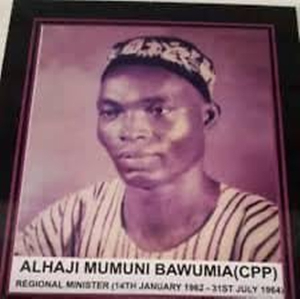- Can We Get a Life-Line From the "Markets"?
Hardly a week goes by in Ghana without some families losing their loved ones from senseless traffic accidents. The traffic unit of the Department of Vehicle and Licensing Authority estimates that an average of six people die daily from vehicular accidents; and many more sustain injuries of various degrees.
Most of the casualties are the sole income earners for their households. Without adequate, or no, personal life insurance policies, loss of lives translates into major income shocks to the bereaved families, often with grave consequences. For example, lacking the necessary support, the kids in these households may have to drop out of school (or, can only sustain mediocre performances), which worsens their own chances of a better life, and eventually deepens the vicious circle of poverty that they are already caught in. So how many more lives must Ghana lose before we address this problem?
The reasons for the carnage on our roads are known by all, including our elected and public officials. I only mention a few here, without belaboring them. On the top of the list is (i) inexperienced, but over-confident, drivers at the wheels of lowly-maintained vehicles, with some of the worse tires in the world running on bad roads; (ii) driver fatigue, (iii) alcohol, and (iv) bad driver vision, compounded by high-beam head-lights from opposing vehicles.
The law enforcement officers, charged with ensuring that drivers comply with the law, but paid a meager salary at the end of the month, will rationally demand and accept a bribe, than arrest offending drivers. It is therefore reasonable to assume that the task of checking for driver-compliance is way beyond the capacity of motor traffic enforcement unit. We need a new, outside-the-box thinking, to stem the bleeding on our roads.
In an article that appeared in the journal Injury Prevention, Charles Mock (University of Washington, Seattle), Justice Amegashie (Vehicle Exam and Licensing Division, Accra) and Kwame Darteh (KNUST, Kumasi) found that in a sample of 122 traffic accidents in the Kumasi Metropolitan Area, about 80 percent involved commercial vehicles (buses, mini-buses, taxis and trucks); and commercial vehicles accounted for over 81 percent of all accident-related injuries in the Kumasi area. In addition to the risk factors listed above, drivers of commercial vehicles also face the constraint of high rental rates charged by vehicles owners; which means they are pushed to work much longer to make the rents plus their daily wages. This imposes severe stress on them, and often compromises road safety for all. A good start in the search of a new transportation policy must therefore begin with this target group.
Countries with low traffic fatalities have one thing in common: commercial vehicles run along company lines. This provides a neat way of delegating the task of road safety to the public (i.e., market forces). To illustrate, suppose our commercial transport industry has two companies: Kofi Bus Corp and Ama Bus Inc. Suppose further that the fleet of cars of these two companies is clearly marked, with distinct company logo, so that the public can identify each company's vehicle. Any visitor to a city in an advanced economy will immediately recognize this model. If commuters notice that Kofi Corp's vehicles make up a large fraction of vehicles involved in accidents, they will cease demanding the services of Kofi Corp. Over time, and in order to stay competitive in the market, each player in the commercial-vehicle industry will evolve to adopt higher safety standards. In other words, the market punishes bad companies and rewards the good ones; and I believe those in charge of our transportation policies are fully aware of this. The task may therefore be how to transform what we have now, to this model. And here is an idea.
First, the Ministry of Transportation must invite tenders to register a number of transportation firms in each district. I reckon that those with experience dealing with local transport unions will line up to start own firms. Then, in order to stay in the business, each of the mini-buses ("tro-tros"), trucks and taxis should be given a period of time (say, 6 months) to register with one any of the registered transportation firms of their choice, and have their vehicles clearly marked with the company's distinct approved logo/colors. To be sure, I see firms charging owners a fee to operate under the company's name; but it will be worth it, because each firm will be selective in the vehicles they sign up, lest a driver drags down its hard-won reputation. In return, these companies will be driven by competition to provide some necessary services for drivers operating under their franchise: for example, getting best-priced parts, contract with garages to provide on-schedule maintenance, etc.
More importantly, with its reputation on the line, each of the companies will only sign up vehicles with the highest standard of roadworthiness, and assist its drivers to acquire the requisite skills. For example, in the same study by Mock, Amegashie and Darteh, it was reported that when drivers were shown three basic road safety signs, 24 percent of them incorrectly interpreted the "no-overtaking" (passing) sign; 17 percent had no idea what the "pedestrian crossing ahead" sign meant; and a 70 percent of the time, these commercial vehicle drivers thought a "sharp bend ahead" signaled something else. I have no doubt that if these drivers had a company's image to maintain, the numbers would have been significantly less. We may even see company owners display telephone numbers on its fleets of vehicles encouraging the public to call in to report any reckless driving, or any rude behavior, on the part of the driver.
It is time to introduce a sensible commercial-vehicle policy that saves lives. Yes, the above proposal will involve some costs, and may even be resisted by individual commercial-vehicle owners. But a well-regulated commercial transport industry that turns each one of us into the "industry's watchdog" may be our only chance. Although they are not totally perfect mechanisms, markets and their price-systems, are great in solving such problems because they unleash the necessary information that guides individuals' decision-making processes. It is time to allow the markets to stem the carnage on our roads, and ensure that commuters return home safely to their families after a hard day of work.
Edward Kutsoati is an associate Professor of Economics at Tufts University and a columnist of www.AfricanLiberty.org
Opinions of Sunday, 1 March 2009
Columnist: Kutsoati, Edward














